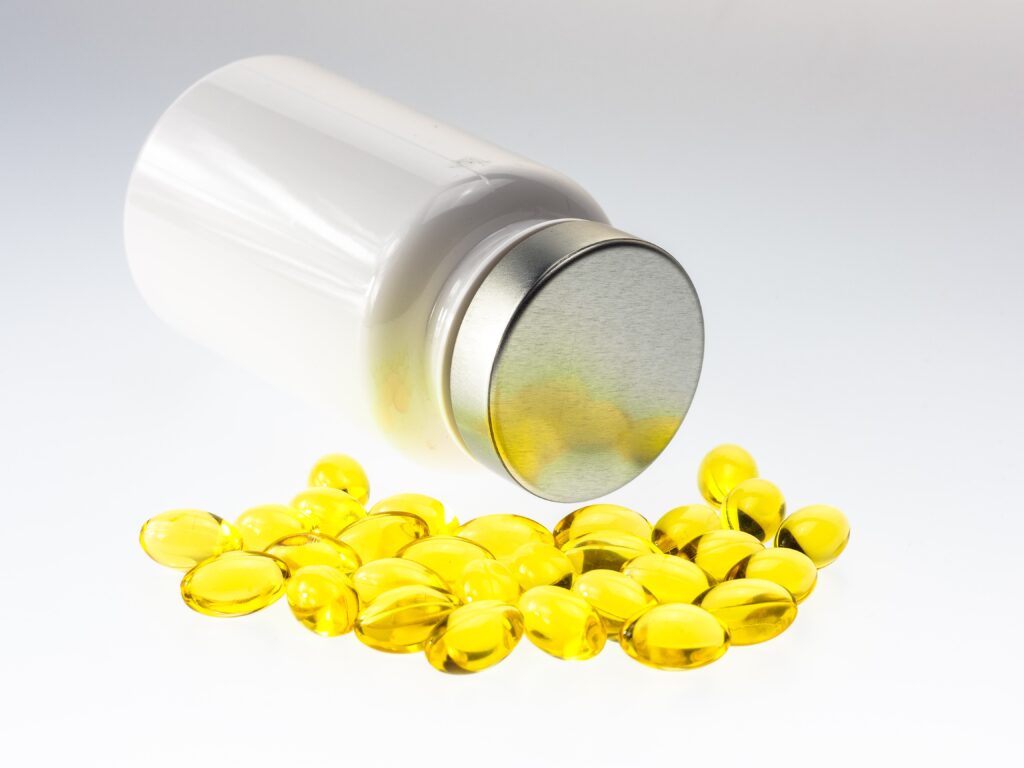Contents
Introduction to Krill Oil and Fish Oil
Krill oil and Fish oil are renowned dietary supplements esteemed for their abundant omega-3 fatty acid content. These omega-3 fatty acids are vital nutrients essential for a multitude of bodily functions, encompassing cardiovascular health, cognitive function, and joint mobility. While both krill oil and fish oil provide an array of health advantages, they diverge notably concerning their origins and bioavailability.
Krill oil, extracted from tiny crustaceans known as krill, boasts omega-3 fatty acids in the form of phospholipids. This distinctive composition is believed to enhance absorption rates compared to the triglyceride form found in fish oil. Consequently, krill oil potentially offers superior bioavailability, allowing for more efficient utilization by the body’s cells and tissues.
On the other hand, fish oil is derived from the tissues of oily fish such as salmon, mackerel, and sardines. It contains two primary types of omega-3 fatty acids: eicosapentaenoic acid (EPA) and docosahexaenoic acid (DHA). While fish oil provides ample quantities of these essential fatty acids, its absorption rate may be lower compared to krill oil due to its triglyceride form.
In essence, the key disparity lies in the molecular structure of the omega-3 fatty acids present in krill oil and fish oil. Krill oil’s phospholipid-bound omega-3s offer potential advantages in terms of absorption and utilization within the body, whereas fish oil’s triglyceride-bound omega-3s provide a more traditional yet still beneficial source of these essential nutrients.

Understanding these differences enables individuals to make informed choices based on their unique health needs and preferences. Whether opting for krill oil or fish oil, incorporating these supplements into a balanced diet can significantly contribute to overall health and well-being.
Health Benefits of Krill Oil
Krill oil, derived from krill crustaceans, is a unique dietary supplement with a unique omega-3 fatty acid content encapsulated within phospholipids. This structure enhances absorption rates, surpassing the triglyceride form found in fish oil supplements. Krill oil offers numerous health benefits due to its bioavailability and nutrient-rich composition.
One of its primary advantages is its potential to support cardiovascular health. Regular consumption of krill oil can reduce triglyceride levels and LDL cholesterol, reducing the risk of cardiovascular diseases like heart attacks and strokes. The phospholipid-bound omega-3s in krill oil also exert anti-inflammatory effects, promoting optimal heart function and circulation.
In addition to its cardiovascular benefits, krill oil is known for its positive impact on cognitive function. The omega-3 fatty acids, particularly docosahexaenoic acid (DHA), are crucial for brain health and neuronal communication. Incorporating krill oil into one’s diet can enhance memory, concentration, and cognitive performance, especially for individuals aging.
Krill oil also has anti-inflammatory properties, making it a valuable ally for individuals with conditions like arthritis. By reducing inflammation and promoting joint lubrication, krill oil can alleviate stiffness and pain, allowing individuals to engage in daily activities with greater ease.
In conclusion, krill oil offers numerous health benefits beyond its cardiovascular, cognitive, and joint-supporting properties.
Cardiovascular Health;Krill Oil and Fish Oil
Research indicates that krill oil can significantly improve cardiovascular health by targeting key biomarkers associated with heart disease. Triglycerides and LDL cholesterol are key indicators that can increase the risk of heart attacks and strokes. Krill oil’s effectiveness in reducing these levels is due to its rich omega-3 fatty acid content, particularly in the form of phospholipids.

These phospholipids facilitate the transportation of omega-3s throughout the body, enhancing their absorption and utilization by various tissues and organs. Regular supplementation with krill oil can decrease triglyceride levels in individuals with elevated levels, lowering their cardiovascular risk. It also modulates LDL cholesterol, or “bad” cholesterol, by promoting its clearance from the bloodstream. This helps mitigate plaque buildup in arteries,
which can narrow blood vessels and impede blood flow, reducing the risk of heart attacks and strokes. Additionally, krill oil’s anti-inflammatory properties help maintain blood vessel integrity, prevent blood clot formation, and maintain optimal heart function. Overall, incorporating krill oil into a balanced diet and regular exercise can help individuals reduce their risk of heart disease and enjoy a longer, healthier life.
Cognitive Function:Krill Oil and Fish Oil
Krill oil, rich in omega-3 fatty acids, particularly docosahexaenoic acid (DHA), is essential for brain health and cognitive function. DHA is abundant in the brain and plays a crucial role in memory formation, storage, and retrieval processes. It nourishes brain cells and enhances synaptic connections, promoting efficient communication between brain cells. DHA also enhances concentration and focus, crucial for cognitive performance.
Adequate levels of DHA facilitate neurotransmitter activity, ensuring optimal neurotransmission across synapses. DHA also exerts neuroprotective effects, shielding the brain from oxidative stress and inflammation, which are linked to cognitive decline and neurodegenerative diseases like Alzheimer’s. By maintaining brain cell integrity and preserving cognitive function, DHA contributes to overall cognitive resilience and longevity. Incorporating krill oil into daily routines provides a convenient and effective way to supply the brain with essential omega-3 fatty acids, particularly DHA.
Joint Health:Krill Oil and Fish Oil
Krill oil is a potent anti-inflammatory supplement that can help combat joint pain and stiffness associated with conditions like arthritis. It targets inflammation at its source, providing relief from discomfort and promoting improved joint mobility and flexibility. The omega-3 fatty acids in krill oil, particularly eicosapentaenoic acid (EPA) and docosahexaenoic acid (DHA), inhibit the production of pro-inflammatory molecules, thereby reducing inflammation and enhancing joint comfort and function.

Incorporating krill oil into daily routines can provide relief for individuals experiencing joint stiffness and restricted mobility. Its unique composition, particularly its phospholipid-bound omega-3s, enhances its bioavailability, allowing for more rapid and sustained relief from joint discomfort. Additionally, krill oil’s antioxidant content contributes to joint health by neutralizing harmful free radicals and protecting cartilage from oxidative damage. This helps maintain joint health and prevent further deterioration associated with arthritis.
In conclusion, krill oil is a valuable supplement for individuals seeking natural relief from arthritis symptoms due to its potent anti-inflammatory and antioxidant properties, enhanced bioavailability, and ability to promote joint comfort, mobility, and flexibility.
Health Benefits of Fish Oil
Fish oil, derived from oily fish like salmon, mackerel, and sardines, is rich in omega-3 fatty acids, particularly eicosapentaenoic acid (EPA) and docosahexaenoic acid (DHA). These essential fatty acids play a crucial role in supporting various aspects of human health, including heart health, cognitive function, and brain health. EPA and DHA have cardioprotective effects, reducing triglyceride levels, lowering blood pressure, and improving cardiovascular function. They also help mitigate the risk of heart disease, including heart attacks and strokes.
Fish oil also contributes to overall inflammatory balance, modulating the body’s inflammatory response and reducing the production of pro-inflammatory molecules. This is beneficial for managing chronic inflammatory conditions like rheumatoid arthritis, inflammatory bowel disease, and psoriasis. DHA, a major component of the retina, is essential for maintaining retinal health and reducing the risk of age-related macular degeneration and other vision-related disorders.
Fish oil also improves skin health and appearance, as it maintains skin barrier function, hydration, and elasticity, promoting a healthy complexion and reducing the incidence of inflammatory skin conditions like acne, eczema, and psoriasis. Incorporating fish oil into a balanced diet or supplementation regimen can be a valuable strategy for promoting overall health and well-being.
Heart Health:Krill Oil and Fish Oil
Fish oil supplementation has been shown to have significant cardiovascular benefits, particularly in reducing blood pressure, triglyceride levels, inflammation, and improving overall heart function. Its omega-3 fatty acids, EPA and DHA, exert vasodilatory effects, relaxing blood vessels and promoting optimal blood flow. This reduces peripheral resistance, reducing blood pressure levels and lowering the risk of hypertension-related complications like heart attacks and strokes.
Fish oil also effectively reduces triglyceride levels, a critical risk factor for cardiovascular disease. Elevated triglyceride levels are associated with an increased risk of atherosclerosis, a condition characterized by plaque buildup in arteries, leading to impaired blood flow and increased susceptibility to heart attacks and strokes. Fish oil helps mitigate this risk and promote cardiovascular health.

Fish oil also has potent anti-inflammatory properties, inhibiting the production of pro-inflammatory cytokines and eicosanoids, thereby reducing the risk of cardiovascular events. It also improves overall heart function and reduces the risk of arrhythmias, irregular heartbeats that can predispose individuals to more severe cardiac complications.
In conclusion, fish oil supplementation offers a multifaceted approach to cardiovascular protection by lowering blood pressure, triglyceride levels, inflammation, and improving overall heart function. Incorporating fish oil into a comprehensive cardiovascular wellness regimen can help individuals reduce their risk of heart disease and enjoy a longer, healthier life.
Eye Health:Krill Oil and Fish Oil
Fish oil, particularly docosahexaenoic acid (DHA), is crucial for maintaining eye health and function. DHA is highly concentrated in the retina, the light-sensitive tissue at the back of the eye, which is responsible for maintaining the structural integrity of photoreceptor cells and supporting visual acuity. DHA is a key component of the cell membranes of photoreceptor cells, ensuring fluidity, flexibility, and stability, which in turn ensures efficient signal transmission and optimal visual function.
DHA’s role extends beyond structural support to include neuroprotective and anti-inflammatory effects. Research has shown that DHA possesses antioxidant properties, protecting retinal cells from oxidative damage caused by free radicals and other harmful molecules. This neutralizes oxidative stress, preserving retinal function and preventing age-related degenerative changes that can impair vision.

DHA’s potential to prevent age-related macular degeneration (AMD) is a significant benefit for eye health. Studies suggest that DHA supplementation may reduce the risk of AMD development and slow its progression by protecting against oxidative damage, inflammation, and abnormal blood vessel growth in the retina.
DHA’s anti-inflammatory properties may also benefit individuals suffering from dry eye syndrome, a common ocular condition characterized by insufficient tear production or poor tear quality. By reducing inflammation and promoting tear film stability, DHA supplementation may alleviate dry eye symptoms and improve overall ocular comfort.
Skin Health:Krill Oil and Fish Oil
Fish oil, rich in essential fatty acids like EPA and DHA, is a valuable addition to skin health and appearance. These fatty acids play a crucial role in nourishing the skin from within, promoting hydration, elasticity, and overall skin health. They help maintain optimal hydration levels, preventing moisture loss and enhancing water retention, leading to a plump, supple complexion and reducing fine lines and wrinkles.
Fish oil also supports skin elasticity, promoting collagen and elastin production, resulting in a smoother, more youthful complexion. Its anti-inflammatory properties make it beneficial for individuals with inflammatory skin conditions like eczema and psoriasis, which can cause redness, itching, and inflammation. EPA and DHA help modulate the body’s inflammatory response, reducing inflammation and alleviating symptoms.
Regular fish oil supplementation can lead to improvements in eczema and psoriasis symptoms, including reduced itching, redness, and scaling. This supplementation provides relief from discomfort and promotes healthier, more resilient skin.
Fish oil’s antioxidant properties protect the skin from oxidative stress and environmental damage, neutralizing free radicals and preventing premature aging and damage caused by UV radiation, pollution, and other environmental aggressors. This antioxidant protection enhances skin radiance and vitality, resulting in a more youthful and luminous complexion.
In summary, fish oil supplements provide a holistic approach to skin health, providing essential fatty acids that nourish the skin from within, maintain hydration, elasticity, and overall appearance.
Comparison Between Krill Oil and Fish Oil
Krill oil and fish oil are both natural sources of omega-3 fatty acids, but they differ in key aspects that may influence individual preferences and suitability for specific health goals. Krill oil is derived from tiny crustaceans called krill, while fish oil is extracted from the tissues of oily fish like salmon, mackerel, and sardines. Its phospholipid structure enhances absorption and bioavailability, potentially leading to higher bioavailability and lower dosage requirements.
Krill oil is considered one of the most abundant marine resources and is harvested sustainably, unlike fish oil which can be prone to environmental contaminants like mercury, PCBs, and dioxins due to bioaccumulation in fish. Krill oil, being lower on the food chain, is less likely to accumulate such contaminants.
Astaxanthin, a powerful antioxidant with anti-inflammatory properties, is naturally present in krill, unlike fish oil which does not typically contain it unless supplemented. However, krill oil supplements tend to be more expensive due to factors such as sourcing, extraction methods, and marketing.
Krill oil capsules may have a milder taste and odor compared to fish oil capsules, which can sometimes have a fishy aftertaste. They may also be smaller in size, making them easier to swallow for those with difficulty with larger pills.
Both krill oil and fish oil are generally well-tolerated, but some individuals may experience minor side effects, making krill oil preferable for those sensitive to fish-derived products. Understanding these differences allows individuals to make informed choices based on their unique health needs, preferences, and considerations such as sustainability and environmental impact. Consulting with a healthcare professional can also help in selecting the most suitable option for achieving specific health goals.
Absorption Rate;Krill Oil and Fish Oil
Phospholipids, a type of lipid, are essential for the absorption and utilization of omega-3 fatty acids in krill oil. These lipids form the basis of cell membranes, including those of intestinal cells responsible for nutrient absorption. Krill oil offers several advantages over fish oil in terms of bioavailability and dosage requirements.
1. Enhanced absorption: Phospholipids facilitate the transport of omega-3 fatty acids across the intestinal barrier more efficiently than triglycerides. They can be readily absorbed intact by enterocytes, the cells lining the intestines, ensuring a higher proportion of omega-3 fatty acids reach the bloodstream.
2. Improved cellular uptake: Once absorbed, phospholipids are incorporated directly into cell membranes, where they participate in essential cellular functions. This direct incorporation enhances the availability of omega-3s to various tissues and organs, including the brain, heart, and joints.
3. Stability and protection: Phospholipids provide a protective barrier around omega-3 fatty acids, shielding them from oxidation and degradation during digestion and transit through the gastrointestinal tract. This enhanced stability ensures a greater proportion of omega-3s remain intact and biologically active, maximizing their therapeutic potential.
4. Reduced dosage requirements: Krill oil may require lower dosage levels compared to fish oil to achieve comparable therapeutic effects. This not only enhances convenience but also helps mitigate the risk of potential side effects associated with high-dose supplementation.
Sustainability;Krill Oil and Fish Oil
Krill, a marine resource, is a highly sustainable source of marine-derived products, including krill oil, due to its high biomass and rapid growth rates. The species’ abundance and reproductive capacity allow them to withstand harvesting pressures without significant depletion or adverse effects on overall population levels. Krill fishing practices are subject to stringent regulations and management measures to preserve krill stocks and minimize environmental impacts. These include catch limits, seasonal closures, and area-based management strategies to protect vulnerable habitats and breeding grounds.
On the other hand, overfishing of certain fish species for oil extraction can have significant environmental consequences, disrupting delicate ecological balances and leading to cascading effects throughout marine ecosystems. Overfishing can lead to declines in predator populations, loss of biodiversity, and altered trophic interactions. The extraction of fish oil from overexploited fish stocks can exacerbate existing environmental pressures, including habitat degradation, pollution, and bycatch of non-target species. Unsustainable fishing practices can also have socioeconomic impacts on coastal communities dependent on fisheries for livelihoods and food security.
In conclusion, sustainable krill harvesting is a viable alternative to overfishing, as it prioritizes responsible management practices and conservation efforts. By prioritizing responsible management practices and conservation efforts, krill harvesting operations can ensure the continued health and resilience of marine ecosystems while meeting the growing demand for marine-derived products.
Side Effects;Krill Oil and Fish Oil
Both Krill oil and Fish oil are widely regarded as safe dietary supplements when consumed in recommended doses. However, like any supplement, they may cause minor side effects in some individuals, although these are typically mild and transient.
- Gastrointestinal Discomfort: Some people may experience digestive issues such as bloating, gas, or diarrhea when taking Krill oil or Fish oil supplements. This is usually due to the high fat content of these supplements, which can sometimes overwhelm the digestive system, particularly if taken on an empty stomach. Taking krill oil or fish oil supplements with meals can help reduce the likelihood of gastrointestinal discomfort.
- Fishy Aftertaste: One common complaint associated with fish oil supplements is a fishy aftertaste or burping. This occurs when the fish oil is not well-absorbed in the digestive tract and is instead broken down by gut bacteria, leading to the release of foul-smelling compounds. Krill oil, with its phospholipid structure, is believed to be more easily absorbed by the body, resulting in fewer instances of fishy aftertaste or burping.
- Allergic Reactions: Although rare, some individuals may be allergic to components of krill oil or fish oil supplements, such as proteins or other compounds present in the oil. Allergic reactions can manifest as itching, rash, swelling, or difficulty breathing. Anyone experiencing symptoms of an allergic reaction should discontinue use of the supplement and seek medical attention immediately.
- Blood Thinning: Both krill oil and fish oil have blood-thinning properties due to their omega-3 fatty acid content, which can interfere with blood clotting mechanisms. While this is generally beneficial for cardiovascular health, individuals taking blood-thinning medications or with bleeding disorders should exercise caution and consult with a healthcare professional before starting krill oil or fish oil supplementation.
- Interactions with Medications: Krill oil and fish oil supplements may interact with certain medications, including blood thinners, cholesterol-lowering drugs, and nonsteroidal anti-inflammatory drugs (NSAIDs). It is essential to consult with a healthcare provider before taking these supplements, especially if you are taking prescription medications or have underlying health conditions.
Personal Experiences with Krill Oil
Krill oil is a highly beneficial dietary supplement that has been shown to have numerous positive effects on various aspects of health and wellness. Its high concentration of omega-3 fatty acids, particularly EPA and DHA, contributes to improved cardiovascular health by lowering triglyceride levels, reducing LDL cholesterol, and increasing HDL cholesterol. This promotes optimal lipid profiles and supports overall heart function, reducing the risk of heart disease.
Krill oil also has potent anti-inflammatory properties due to its omega-3 fatty acid content and unique phospholipid structure. These properties help to alleviate chronic inflammation, leading to improvements in conditions like arthritis, joint pain, and inflammatory skin disorders. Additionally, omega-3 fatty acids, particularly DHA, play a crucial role in brain health and cognitive function, contributing to enhanced cognitive performance and potentially reducing the risk of age-related cognitive decline.

Krill oil’s anti-inflammatory properties make it particularly beneficial for individuals experiencing joint pain and stiffness. By reducing inflammation in joints and supporting cartilage health, it helps to alleviate symptoms of conditions such as arthritis and rheumatic disorders. Additionally, krill oil contributes to healthier, more radiant skin by maintaining hydration, elasticity, and barrier function, reducing the appearance of fine lines, wrinkles, and dryness.
In conclusion, krill oil offers numerous benefits for overall health and well-being, including improved cardiovascular health, reduced inflammation, enhanced cognitive function, better joint health, and healthier skin. These positive experiences highlight the therapeutic potential of krill oil as a valuable dietary supplement for promoting optimal health and vitality.
Improved Cardiovascular Health;Krill Oil and Fish Oil
Krill oil is a natural supplement that has been shown to have numerous health benefits. It can help reduce the risk of cardiovascular diseases such as heart attacks, strokes, and atherosclerosis by promoting a favorable lipid profile. It also helps improve blood pressure, particularly in individuals with hypertension or prehypertension, by promoting vasodilatory effects of omega-3 fatty acids. This helps lower blood pressure levels and reduce strain on the heart, leading to improved cardiovascular function and reduced risk of hypertension-related complications.
Krill oil also increases energy levels, as it enhances mitochondrial function, which is crucial for efficient energy production and metabolism. This boost in energy can help combat fatigue and promote overall well-being. Additionally, krill oil has positive effects on mood and psychological well-being, as it supports neurotransmitter function in the brain and nervous system, regulating mood and reducing symptoms of depression and anxiety.
Krill oil also has anti-inflammatory effects, which help reduce systemic inflammation throughout the body, including in blood vessels and tissues. This contributes to improved cardiovascular health, enhanced immune function, and reduced risk of inflammatory conditions like arthritis, diabetes, and metabolic syndrome. In summary, krill oil is a valuable dietary supplement for promoting cardiovascular health and vitality, thanks to its therapeutic properties of omega-3 fatty acids and other bioactive compounds.
Enhanced Cognitive Function;Krill Oil and Fish Oil
Krill oil is a popular supplement that has been linked to improved mental clarity, improved focus, and enhanced memory retention. Its rich content of omega-3 fatty acids, particularly docosahexaenoic acid (DHA), plays a crucial role in maintaining optimal brain function by enhancing neuronal communication and signaling. This leads to clearer thinking and improved mental clarity.
Krill oil also improves focus and concentration, as it promotes neuroplasticity, the brain’s ability to adapt and form new connections in response to stimuli. This leads to better productivity and task performance. DHA is essential for synaptic function and the formation of new memories, facilitating efficient encoding, storage, and retrieval of information.
Regular krill oil supplements can increase alertness and mental sharpness, as they regulate neurotransmitter levels in the brain, including dopamine and serotonin. This helps to enhance alertness and cognitive vigilance, leading to improved overall cognitive performance.
In conclusion, krill oil supplementation offers a range of cognitive benefits, including sharper mental clarity, improved focus, enhanced memory retention, increased alertness, and enhanced cognitive performance. By supporting brain health and function, krill oil helps individuals optimize their cognitive abilities and achieve their full potential in various aspects of life.
Better Joint Mobility;Krill Oil and Fish Oil
Krill oil is known for its anti-inflammatory properties, which have been beneficial for individuals suffering from joint pain and stiffness, especially those with arthritis. It contains potent anti-inflammatory compounds, such as omega-3 fatty acids and astaxanthin, which help reduce inflammation in the joints, alleviating pain and improving joint function. This relief is particularly beneficial for those with chronic pain and discomfort, which can significantly impact their quality of life.
Krill oil’s ability to reduce inflammation and lubricate joints promotes greater flexibility and range of motion, allowing users to perform tasks such as walking, climbing stairs, and bending with greater comfort and flexibility. This relief extends beyond physical mobility to overall comfort and well-being, allowing users to enjoy a better quality of life and participate in activities they may have previously avoided due to pain.
In addition to its anti-inflammatory effects, krill oil provides essential nutrients that support overall joint health. Omega-3 fatty acids play a crucial role in maintaining the structural integrity of joint tissues, including cartilage and synovial fluid. By nourishing and protecting these tissues, krill oil helps preserve joint function and prevent further degeneration, contributing to long-term joint health and mobility.
In conclusion, krill oil’s anti-inflammatory properties offer significant benefits for individuals suffering from joint pain and stiffness, allowing them to maintain an active and fulfilling lifestyle free from the limitations imposed by arthritis symptoms.
Personal Experiences with Fish Oil
Fish oil, rich in omega-3 fatty acids, has been found to offer numerous health benefits. Its high content of EPA and DHA, which are essential for maintaining a healthy cardiovascular profile, contributes to a healthier heart. Fish oil also has anti-inflammatory properties, helping to alleviate joint pain and stiffness, promoting greater mobility and flexibility. Its omega-3 fatty acids, particularly DHA, are crucial for brain function and cognitive health, enhancing memory, mental clarity, and focus.
Fish oil also supports mood regulation and emotional well-being, as it helps to balance neurotransmitters like serotonin and dopamine, which are essential for mood regulation. This leads to improved emotional resilience and overall well-being. Fish oil’s anti-inflammatory and antioxidant properties also contribute to healthier skin, with users reporting improvements in hydration, elasticity, and overall appearance. These positive experiences highlight the diverse therapeutic benefits of fish oil and its role in supporting overall health and well-being. Overall, fish oil supplements have been found to be a valuable tool for maintaining overall well-being.
Improved Heart Health
Fish oil is a highly beneficial dietary supplement that has been shown to significantly reduce triglyceride levels, cardiovascular risk factors, and chest pain. Its rich omega-3 fatty acids, particularly EPA and DHA, help lower triglyceride levels, which are known risk factors for cardiovascular disease. Fish oil also helps improve lipid profiles, reducing the risk of heart disease and related complications.
Fish oil supplementation has been associated with improvements in other cardiovascular risk factors, such as LDL cholesterol, blood pressure, and inflammation markers. This contributes to a healthier cardiovascular profile and reduces the risk of heart disease, heart attacks, and strokes. Fish oil’s anti-inflammatory and vasodilatory effects help improve blood flow to the heart, reducing the frequency and severity of angina episodes.
Fish oil also improves heart function and cardiac performance, as EPA and DHA play crucial roles in maintaining the integrity of cardiac cell membranes and supporting normal heart rhythm. It also enhances endothelial function, the lining of blood vessels, which is essential for maintaining proper blood flow, regulating blood pressure, and preventing blood clot formation.
In conclusion, fish oil is a valuable dietary supplement for promoting heart health and reducing the risk of cardiovascular disease.
Enhanced Vision;Krill Oil and Fish Oil
Fish oil has been found to significantly improve vision clarity and acuity, particularly during prolonged screen time or low-light conditions. Its rich omega-3 fatty acids, including DHA, are essential for maintaining optimal eye health, supporting the integrity of retinal cells and enhancing visual signal transmission. Fish oil’s anti-inflammatory properties help alleviate ocular inflammation and soothe irritated eyes, reducing the frequency and severity of eye strain symptoms.
Fish oil also provides relief from dry eyes, a common condition characterized by insufficient tear production or poor tear quality. Its omega-3 fatty acids help maintain tear film stability and lubrication, preventing evaporation and improving ocular surface hydration. Regular fish oil supplementation can reduce dryness, itching, and burning sensations in the eyes.
Fish oil also enhances visual comfort, particularly during tasks requiring prolonged visual focus. It promotes optimal tear production and lubrication, reducing discomfort associated with prolonged screen time or exposure to environmental factors. Fish oil also reduces the risk of age-related macular degeneration (AMD), a leading cause of vision loss in older adults. By supporting retinal health and function, fish oil helps maintain visual acuity and prevent vision loss associated with aging.
In conclusion, fish oil is a valuable dietary supplement for promoting optimal eye health and maintaining visual acuity and comfort.
Healthier Skin;Krill Oil and Fish Oil
Fish oil is a popular skincare product due to its moisturizing and anti-inflammatory properties. It is rich in omega-3 fatty acids, which are essential for skin hydration and preventing moisture loss. These fatty acids strengthen the skin’s natural barrier function, making it feel softer, smoother, and more supple.

Fish oil also reduces dryness, a common concern, by providing essential fatty acids that nourish and hydrate the skin. It also helps alleviate redness, a common issue in inflammatory skin conditions like rosacea and eczema. Fish oil’s anti-inflammatory properties help calm inflamed skin and reduce redness, making it an effective remedy for soothing irritated skin. It also helps prevent acne breakouts by reducing inflammation and inhibiting the production of pro-inflammatory molecules involved in acne development. Regular fish oil supplementation results in a more radiant complexion, with a healthy glow, improved skin texture, diminished imperfections, and a more even tone. This combination of benefits contributes to maintaining healthy, youthful-looking skin and enhancing overall skin tone and texture.
Conclusion
Krill oil and fish oil offer numerous health benefits, including cardiovascular support, cognitive enhancement, and joint relief. Both are rich sources of omega-3 fatty acids, which help lower triglyceride levels, reduce inflammation, and improve lipid profiles, reducing the risk of heart disease. Regular supplementation may lead to improved memory, mental clarity, and focus, contributing to overall well-being.
Joint relief is also beneficial for individuals suffering from joint pain and stiffness, as they possess anti-inflammatory properties that promote joint mobility and flexibility. Krill oil, which contains phospholipids, enhances absorption, potentially reducing dosage requirements. It is considered a sustainable marine resource, unlike fish oil, which can lead to environmental concerns and depletion of marine ecosystems.
Potential side effects of both krill oil and fish oil include gastrointestinal discomfort and fishy aftertaste, with krill oil being a preferable option for those sensitive to fish-derived products. Incorporating both supplements into a balanced diet and healthy lifestyle can contribute to overall well-being and vitality.
FAQs
- What is the recommended dosage of krill oil or fish oil supplements?
- The recommended dosage of krill oil or fish oil supplements may vary depending on individual health goals and dietary needs. It is advisable to consult with a healthcare professional to determine the appropriate dosage based on factors such as age, weight, and existing medical conditions.
2. Are there any potential side effects associated with krill oil or fish oil supplementation?
- While krill oil and fish oil supplements are generally safe for most people when taken in recommended doses, some individuals may experience minor side effects such as gastrointestinal discomfort or fishy aftertaste. It is essential to follow dosage instructions and consult with a healthcare professional if any adverse reactions occur.
3. Can krill oil or fish oil supplements interact with medications?
- Krill oil and fish oil supplements may interact with certain medications, particularly blood thinners such as warfarin or aspirin. It is crucial to inform your healthcare provider about any supplements you are taking to avoid potential interactions and adverse effects.
4. Are krill oil and fish oil supplements suitable for vegetarians and vegans?
- Krill oil and fish oil supplements are derived from marine sources, making them unsuitable for vegetarians and vegans. However, vegetarian-friendly alternatives such as algae-based omega-3 supplements are available for individuals seeking plant-based options.
5. How long does it take to experience the benefits of krill oil or fish oil supplementation?
- The time it takes to experience the benefits of krill oil or fish oil supplementation may vary depending on individual factors such as dosage, frequency of use, and overall health status. Some users may notice improvements within a few weeks, while others may require more extended periods of supplementation to experience significant benefits.

